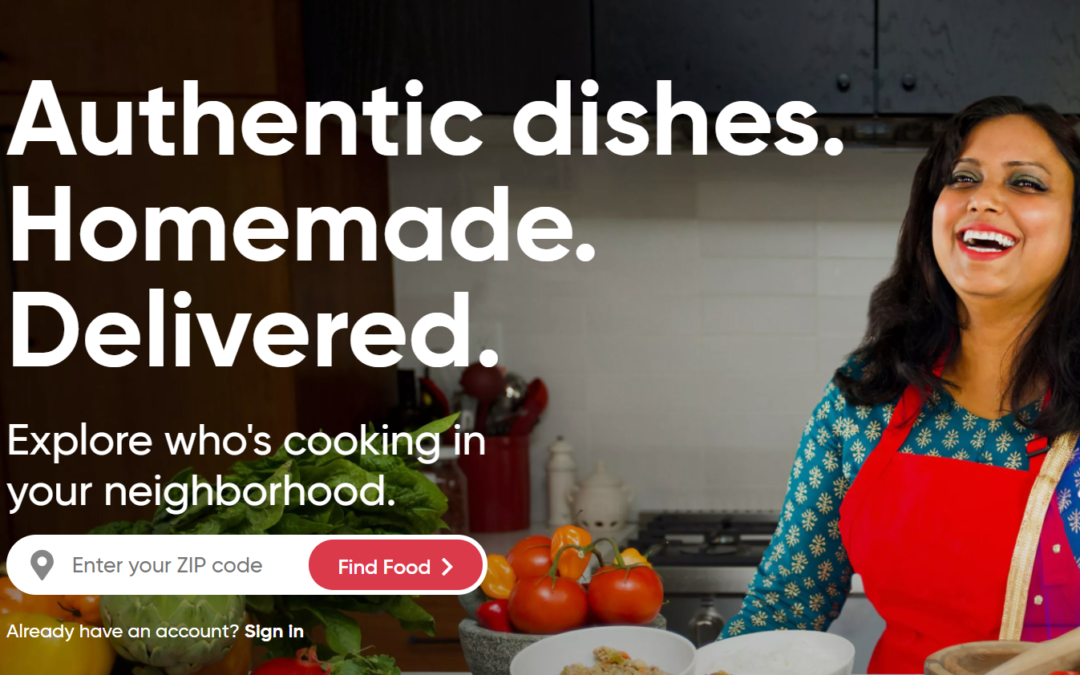When an immigrant comes to the U.S., they are often leaving behind horrific situations. They must start all over again and finding employment can be tricky. Frequently, many of those new will turn to cooking their native food for friends and family nearby. Shef, an online solution, allows anyone, especially immigrants, to start their own business.
With technology, business, and marketing support, Shef is a path to income and a chance to use their home food as cultural ambassadors. Think of the thousands of recent Afghanis coming to the states who might use their skills in the kitchen to help pay for rent.
The Shef platform allows you to see the individuals preparing your food, and like Uber Eats and Door Dash, you can see photos of the dish, set up an account, and have it delivered. The food types may differ from conventional fare Mexican, Italian or Chinese fare with Haitian, Nepalese, and distinctive Indian regions like Udupi. You need to place orders a day or two ahead, so this isn’t quite impulse consumption.
Innovation for Immigrants
After a failed restaurant venture, Alvin Salehi, along with Joey Grassia, started Shef. They knew that they couldn’t compete with the Door Dash’s of the delivery world, but he knew that immigrant food made at home might be an ample opportunity. He recognized that regulations could prevent some from cooking and selling out of their kitchen, but he didn’t let that get in the way.

To comply with regulations, each Shef has to go through rigorous food safety and certification processes. They must wear hairnets, like in any restaurant or food preparation commissary and, their site rating must stay above a specific number. They currently have more than 16,000 people waiting to join – but the onboarding process is slow due to the critical importance of food safety.
Each Shef is a 1099 contractor, not an employee. And like an Uber driver, they get access to the platform once they pass certification. They are also feeling the challenges and pressure of recent inflations issues, and many have had difficulty getting a fair price for the quality of what they sell. Shef takes a 15% transaction fee per order. Typically, according to their site, a Shef can earn $40/hour.
So far Shef has served over one million meals.
First-Hand Experience
I know that most states only allow shelf-stable foods to be made at home. In 1975, my wife and I dealt with some legal issues because we were baking our brownies in a home, not a bakery. Today only California and Utah allow people to sell foods prepared at home. Shefs in other states end up cooking in shared commercial kitchens, and the company has partnered with several of these new ventures.
In Raleigh, Kitchen Archive allows you to rent space to sell food direct to consumers. Shef has teamed up in San Francisco and Seattle with commercial kitchen/ghost kitchen partners. And, not surprisingly, Shef has received almost 30 million dollars in startup funding, and celebrity investors include Katy Perry and Padma Lakshmi.
Like Notarize, an online notary business I wrote about recently, Shef’s most significant challenges are the entrenched regulatory laws for food preparation, sale, and distribution.
Lessons for the Entrepreneur
- How can you get into a growing category in a new, different, and distinctive approach? Competing with other food delivery giants would be crazy – but finding a narrow niche where demand and opportunity collide makes sense. If you are a generalist – you blur into the wallpaper. Find someone specific to serve and become OF their community. A marketplace with tremendous demand and opportunity often means there are places for niche players. Shef is going after a huge TAM (total addressable market) – but just looking for a small slice of the home delivery pie.
- Positioning your brand as a “door dash for immigrant cooks” is precise and straightforward to understand. Given their waiting list of 16,000 applicants, the demand to use the platform is healthy and can attract capital. However, competition from ghost kitchens might be the most difficult challenge. Renting space in a ghost kitchen allows you to not worry about the regulations – and focus on food and marketing. Marketing is a big challenge for an immigrant, but it might be easier to navigate than regulatory hurdles. Yet, Shef has a beautiful story that could, over time, give them a springboard for success. What business are you like – but just focused on a narrower segment? Or, are you a generalist in need of a niche?
- Getting adequately capitalized is critical. With all the things Shef must do to get off the ground, profitability is unlikely until they hit a diminishing scale. No one ever thought Amazon would make money- and they didn’t for at least 15 years. But if you can get your ‘flywheel’ in motion, and you are tapping a significant market demand that big, great thing can happen. But it takes money to get the gears of your flywheel in motion.
Got an idea you are noodling? I’m always happy to listen. Just remember – think narrow and specific, not general and wide.
You can set up a time to chat with me about your marketing challenges using my calendar. Email me jeffslater@themarketingsage.com Call me. 919 720 0995. The conversation is free, and we can explore if working together makes sense. Watch a short video about working with me.





